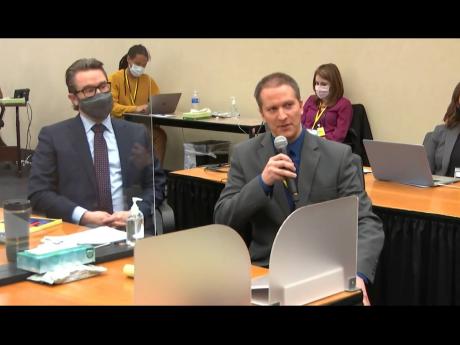Defence rests without Chauvin testimony at murder trial
MINNEAPOLIS (AP):
Former Officer Derek Chauvin chose not to take the stand as testimony at his murder trial ended Thursday, passing up the chance to explain to the jury and the public for the first time what he was thinking when he pressed his knee against George Floyd’s neck.
Closing arguments are set to begin Monday, after which a racially diverse jury will begin deliberating at a barbed-wire-ringed courthouse in a city on edge – not just because of the Chauvin case but because of the deadly police shooting of a 20-year-old Black man in a Minneapolis suburb last weekend.
Before the jury was brought in Thursday morning, Chauvin, his COVID-19 mask removed in a rare courtroom moment, ended weeks of speculation by informing the judge he would invoke his Fifth Amendment right not to testify.
Shortly afterwards, the defence rested its case, after a total of two days of testimony, compared with two weeks for the prosecution.
Judge Peter Cahill reminded the jurors they will be sequestered starting Monday and said: “If I were you, I would plan for long and hope for short.”
Chauvin, 45, is charged with murder and manslaughter in Floyd’s death after the 46-year-old Black man was arrested on suspicion of passing a counterfeit $20 at a neighbourhood market last May.
Bystander video of Floyd gasping that he couldn’t breathe as bystanders yelled at Chauvin to get off him triggered worldwide protests, violence and a furious examination of racism and policing in the US.
The most serious charge against the now-fired white officer, second-degree murder, carries up to 40 years in prison, though state guidelines call for about 12.
Prosecutors say Floyd died because the officer’s knee was pressed against Floyd’s neck or close to it for 9-1/2 minutes as he lay on the pavement on his stomach, his hands cuffed behind him and his face jammed against the ground.
Law-enforcement veterans inside and outside the Minneapolis department testified for the prosecution that Chauvin used excessive force and went against his training, while medical experts said Floyd died of asphyxia, or lack of oxygen, because his breathing was constricted by the way he was held down.
Chauvin attorney Eric Nelson called a police use-of-force expert and a forensic pathologist to help make the case that Chauvin acted reasonably against a struggling suspect and that Floyd died because of an underlying heart condition and his illegal drug use. Floyd had high blood pressure and narrowed arteries, and fentanyl and methamphetamine were found in his system.
The only time Chauvin has been heard defending himself was when the jury listened to body-camera footage from the scene. After an ambulance had taken Floyd away, Chauvin told a bystander: “We gotta control this guy ’cause he’s a sizeable guy ... and it looks like he’s probably on something.”
With the trial in session, Minneapolis has been bracing for a possible repeat of the protests and violence that broke out last spring over Floyd’s death.
The case has unfolded amid days of protests in the adjoining suburb of Brooklyn Center, after Officer Kim Potter, who is white, apparently mistook her gun for a Taser and fatally shot Daunte Wright. She resigned and was charged with manslaughter.

